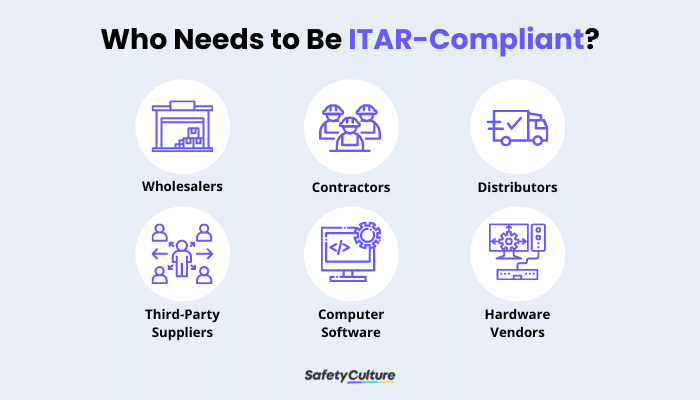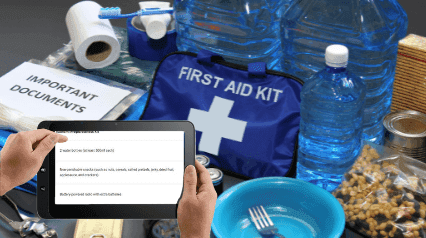All You Need to Know About ITAR Compliance
If you’re in the business of manufacturing or exporting defense-related articles, you’re likely aware of ITAR compliance. But what does it entail, exactly? And why is it so important?

Published 18 Feb 2025
Article by
4 min read
What Does It Mean to be ITAR Compliant?
The International Traffic in Arms Regulation (ITAR) compliance is all about safeguarding US defense technology and intellectual property. According to the United States Munitions List (USML), the restricted defense article and military data include some of the following:
Launch vehicles, ballistic missiles, torpedoes
Military electronics
Guns and armament
Aircraft and related articles
Spacecraft and related articles
The list also contains diagrams, plans, photos, and other documents for building and making ITAR-controlled military gear.
In order to protect this information, any company that wants to do business with the US government (or just with government contractors) must adhere to these regulations.
Failure to comply with ITAR can result in hefty fines, loss of export privileges, and even criminal charges. For this reason, it’s essential for companies to understand and implement ITAR compliance procedures.
Why is it Essential to Your Business?
Your business may not be aware of this, but there is an entire set of regulations known as ITAR governing the export of military and defense-related items and technical data.
ITAR compliance is essential because non-compliance can result in grave penalties, criminal charges, and even imprisonment. Just one violation can result in any of the following sanctions:
Up to $500,000 worth of civil fines for each violation
Up to $1 million worth of criminal penalties
Up to ten years of imprisonment per violation
The best way to avoid these consequences is to ensure your business fully complies with ITAR. This means implementing the right procedures and training your employees on how to comply with the regulations.
Ignorance of the law is no excuse, so make sure your business is taking the necessary steps to comply with ITAR today.
Ensure Compliance with Manufacturing Regulations
Simplify internal audits, capture site observations, and address gaps in compliance to meet regulatory requirements.
Who Needs to be ITAR-Compliant?

Any business manufacturing or exporting defense-related must follow ITAR compliance. The Directorate of Defense Trade Controls (DDTC) has a list of companies that deal with USML goods and services required to comply with ITAR regulations. The list includes the following:
Wholesalers
Contractors
Computer Software
Hardware Vendors
Distributors
Third-party Suppliers
How Do I Get ITAR Compliance?
There are people who mistake being ITAR certified when getting compliant; this is a common misconception as there is no such thing as being ITAR-certified. Instead, there is only a regulatory requirement to be registered and compliant.
To adhere to these standards, you must undergo a registration process required by the State Department’s DDTC.
So how do you get to register? According to the DDTC, below are some steps you can follow:
Log in to the Defense Export Control and Compliance System (DECCS) website .
Fill out an unsigned DS-2032 Registration Form .
Provide supporting documentation .
Monitor your registration status.
Pay the registration fee.
Get your registration letter.
Please keep in mind that these steps are only the registration process and do not mean that your company is immediately ITAR-compliant.
Digitize the way you Work
Empower your team with SafetyCulture to perform checks, train staff, report issues, and automate tasks with our digital platform.
How Do I Ensure My Company Complies with ITAR Regulations?
The best way to ensure your company is ITAR compliant is by comprehensively understanding the regulations and taking the necessary steps to implement them.
You’ll need to create and enforce policies and procedures that meet ITAR compliance and designate an individual or team responsible for it. You’ll also need to regularly audit your systems or use an ITAR Compliance Checklist to ensure they’re still compliant.
Use SafetyCulture to Help with ITAR Compliance
What is SafetyCulture?
SafetyCulture is a comprehensive transportation support solution for businesses and organizations complying with the requirements imposed by the ITAR. This mobile app can be used to manage daily tasks, inspections, maintenance, and compliance with all federal regulations related to the international transport of arms.
Features:
Instantly capture photos or videos of ITAR-controlled products and assign proper actions
Access checklists anytime, anywhere easily using any mobile device
Send and receive notifications for scheduled audits
Automatically create and share ITAR compliance reports to key personnel
Free to use for small teams. Limitless integrations , reports and storage, and real-time analytics for premium accounts.
ITAR Compliance FAQs
Article by
SafetyCulture Content Team
SafetyCulture Content Contributor, SafetyCulture
View author profileRelated articles
Risk Assessment
Safety

The Ultimate Guide to Emergency Preparedness and Response
Learn how you can develop an effective emergency plan and stay one step ahead of natural disasters or other catastrophes.
Safety
Safety Management

Disaster Preparedness Plan
Learn more about the disaster preparedness plan, its importance, features, and example. Find out how a digital tool can help prepare against disasters.
Safety
Agriculture Safety

The Importance of Post-Harvest Management
Learn what post-harvest management is, its importance, and the core stages of the process.